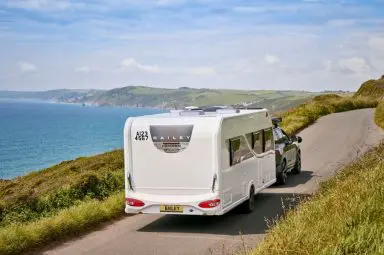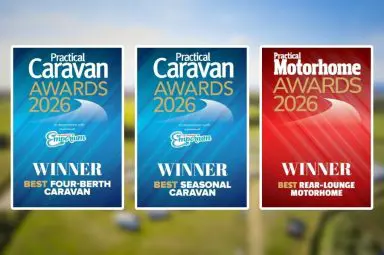Our Top 20 Caravanning in Europe Tips
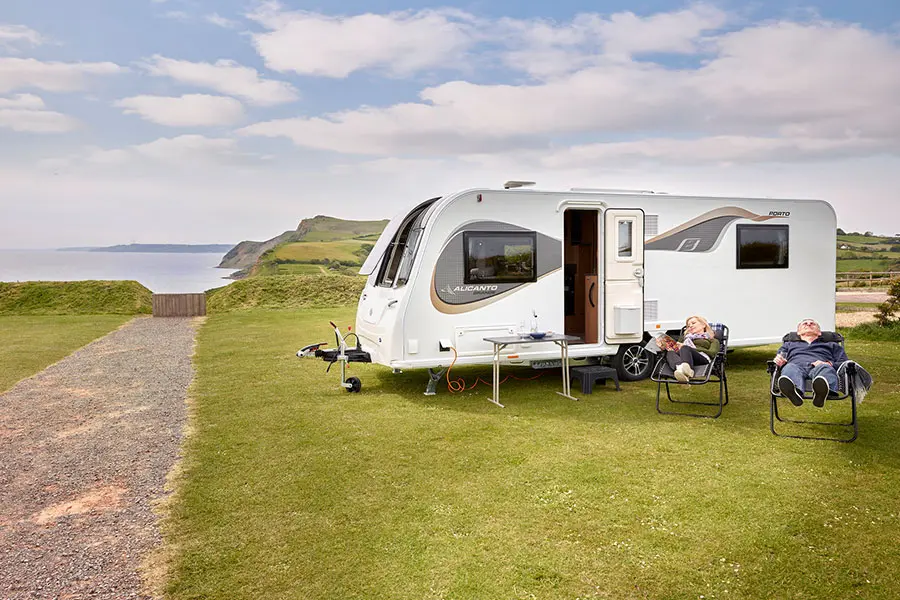
Planning a trip to Europe is exciting and offers a wealth of countries to visit within a relatively short distance. Each has unique cultures, histories and tourist sites for you to see.
However, travelling abroad with your leisure vehicle may feel daunting if you haven’t done it before.
Here are our top 20 caravanning in Europe tips to help you have a great caravan or motorhome holiday.
1. Make sure you have caravan or motorhome insurance that covers you in Europe
Make sure that you have an insurance policy that covers you during your time abroad and make sure the insurance will cover you for all possible eventualities.
There are a number of ways to find caravan insurance or motorhome insurance. For example, you can look on the traditional price comparison websites or go to a specialist insurer.
If you are a member of the Caravan and Motorhome Club or the Camping & Caravanning Club then they also offer insurance products to their members – check their websites for more details.
Also ensure that your tow car insurance will cover you in Europe. Check with your insurer before you travel to see if you need to make any changes and if you need to carry a green card.
There’s more information on driving in the EU on the government website.
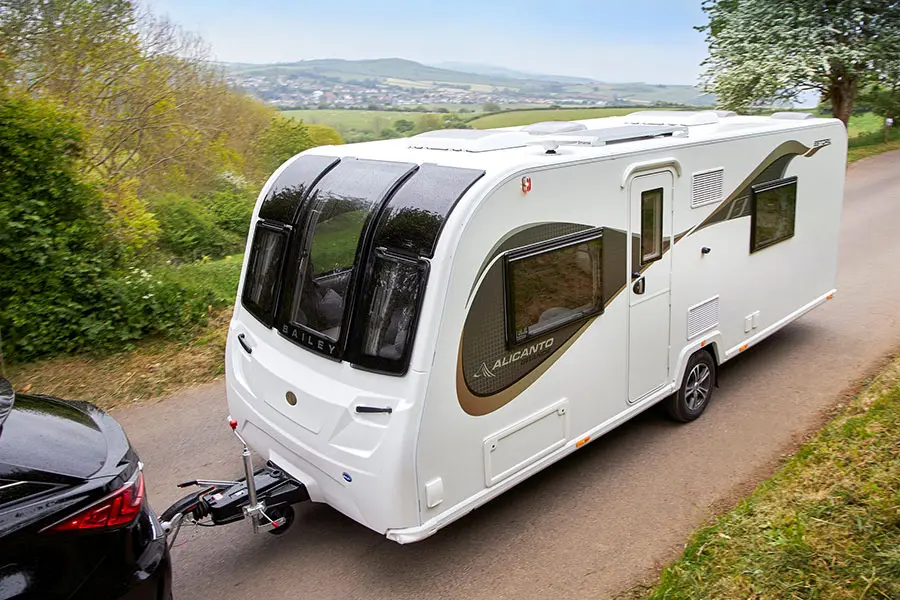
2. Ensure you have European cover on your breakdown policy
Check your breakdown policy to make sure that it will cover you in Europe for everything you may need and if necessary, add European cover before you set off.
Consider the countries you are travelling through, and make sure you are covered again for all eventualities.
Specialist motorhome breakdown cover and car and caravan breakdown policies are available with the latter covering both your caravan and your towing vehicle.
As for insurance, you can find breakdown cover on comparison sites and also through the Camping & Caravanning Club or the Caravan and Motorhome Club if you are a member.
3. Choose how you are going to reach the continent
You have two options for getting your caravan or motorhome across the channel to Europe;
- By ferry
- Via the Channel Tunnel on the Eurotunnel Le Shuttle train
By ferry
Ferries are slower than the Channel Tunnel, but can be a relaxing way to break up your trip.
Leaving from ports such as Dover, Portsmouth or Plymouth, you’ll find services that will take you to France or Spain and into mainland Europe.
If you’re travelling with pets, then some ships even offer pet-friendly cabins so you can remain with your furry friend for the duration of the journey.
You can book your caravan or motorhome onto cross channel ferries using their website.
You’ll usually need the length and height of your car and / or leisure vehicle to ensure you are making the correct booking.
Check their website as well for any further information that you might need to supply.
If you are a member of the Caravan and Motorhome Club or the Camping & Caravanning Club, they offer discounts on ferry travel. Check their websites before you book to take advantage of these offers.
By train
If you need to get to France quickly or you don’t want to take the ferry, the Eurotunnel will take you from Folkestone to Calais in about 40 minutes.
This is a popular option with pet owners as you can keep your pet in your vehicle.
Check the Eurotunnel website to ensure your leisure vehicle is ready to travel and meets the requirements.
Discounts are once again available for members of the Caravan and Motorhome Club and the Camping & Caravanning Club when booking through the clubs. See their website for details.
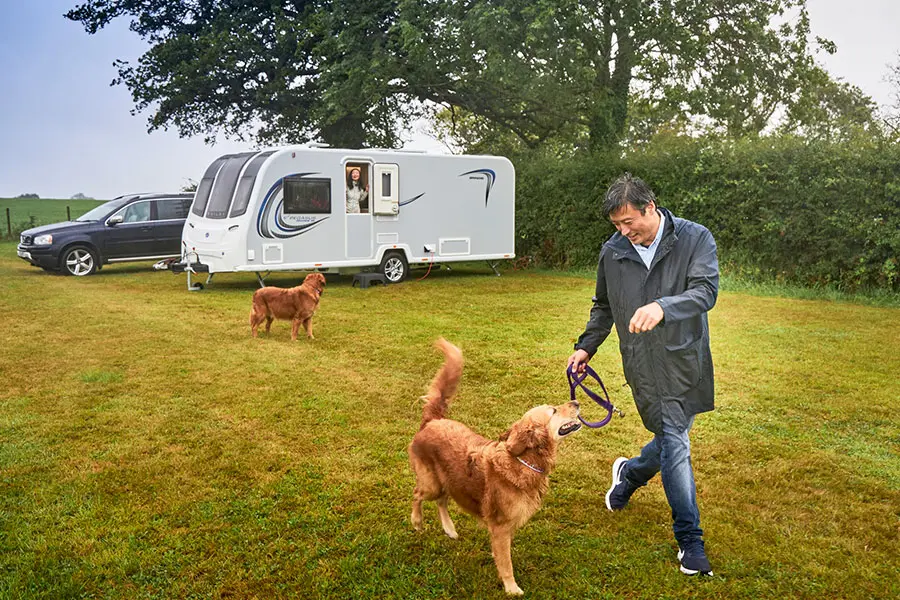
4. Route plan before you set off
Whether you’re planning a month long road-trip or have decided to relax on a single site for a week or two, properly planning your route in advance will help you get the most from your time away.
You can go old-school and use printed maps of the area that you are planning to travel in, or if you normally rely on Google Maps, there’s a little trick you can use if you are staying on multiple sites, and that is to switch to Google My Maps.
Google My Maps allows you to add up to 23 waypoints across one single trip and means you can easily plan nightly stopovers across your entire holiday.
For each waypoint you can add a description, links to your campsite, and link any documents such as site bookings or attraction tickets, so you can easily keep track of everything.
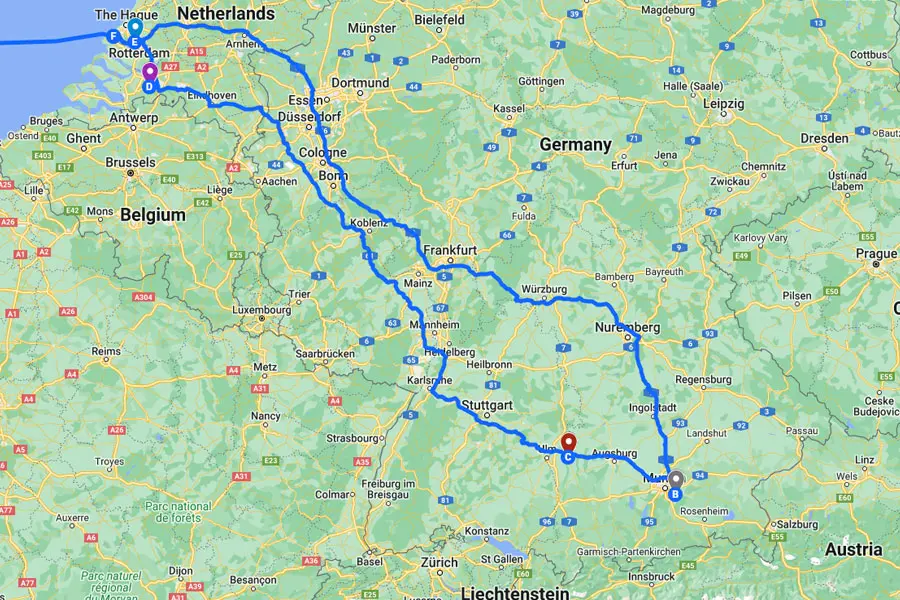
Google My Maps is also handy for those who are road-tripping in rural areas where WIFI or even cellular data isn’t available as you can download your trip to your phone before you leave. Your phone’s GPS will then help you to stick to your route.
To use Google My Maps, you’ll need to sign in with a free Google account.
Find out how to use Google My Maps with this tutorial
5. Taking your pet with you
The UK government has information on their website to help you bring your dog, cat or ferret on holiday with you. You can check this here
Travel to the UK or Northern Ireland
If you are travelling to an EU country or to Northern Ireland, you will need to check the rules of the country you are travelling to for any additional restrictions or requirements, but your pet will need the following:
- A microchip
- A valid rabies vaccination
- An animal health certificate
- Tapeworm treatment for dogs may be required in some countries
Further information is available on the government website should you want to take your pet to a non-EU country.
6. Booking your campsite
There are thousands of campsites throughout Europe and you can find lots of information on line that will also allow you to book either directly or through campsite finder websites.
If you are planning on a tour, you may want to plan your route first and then decide on the campsites that you want to stay at along the way.
Or if you are interested in staying at a particular site, you can often get all the information you need about that site online to help you make your booking.
Two of the UK’s largest caravan and motorhome clubs – The Caravan and Motorhome Club and the Camping and Caravanning Club – list campsites across several countries in the EU which makes it easy to find and book a reputable site.
Both clubs offer their own sites as well as privately owned sites that are affiliated with the clubs.
All affiliated clubs must have reached the standards of the club they are connected to, which makes it easier to find a good quality campsite online.
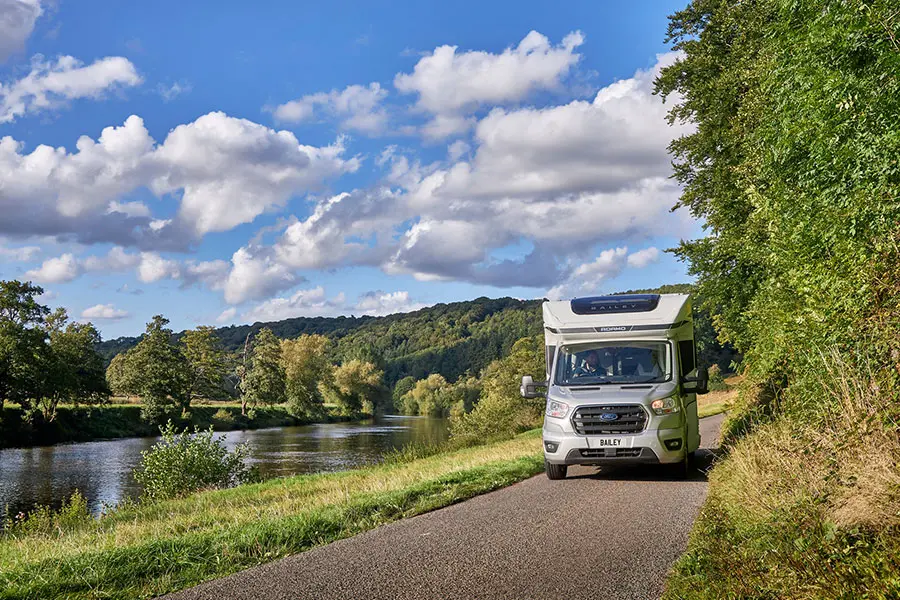
7. Tips for driving in Europe
There are a number of things that you will need to take with you when driving in Europe. The RAC has a very useful European driving checklist here
You will need to remember to take important documents with you such as your driving licence, national insurance number, passport, V5C, travel insurance, European Breakdown Cover, and Crit’air sticker if driving in France. Check the link above for full details.
You can also find information on the European Commission’s website for each country relating to things like speed limits, seatbelt rules and alcohol limits. Find this information here
Don’t forget you’ll also need a UK sticker for the back of your vehicle.
8. Ensure that you have all the correct equipment
There are some items that you will need to have with you for driving in Europe. Make sure you have the following:
- Reflective jackets (one for each passenger and kept within the cabin of the car)
- A warning triangle (most countries require this)
- Headlamp beam deflectors – these are stickers that you place on your headlamps to adjust the angle of the beam. As we drive on the left in the UK, the headlights need to be adjusted for driving on the right so that they don’t dazzle other road users. You can buy beam deflectors online or from places like Halfords in the UK.
- UK car sticker. Remember to replace your GB sticker if you had this before. The UK sticker is now required since September 2021.
- First aid kit (this is compulsory in Austria, France and Germany)
- A breathalyser kit
- A Crit’Air clean air sticker when travelling to certain cities in France to identify your vehicle’s air pollution emissions
This may not be an exhaustive list so check the countries you are travelling to to ensure you have everything you may need.
9. Motorhome Aires
Across Europe there are overnight stopping places for motorhomes which are known as aires in France and Spain. In other parts of Europe they also exist but may be known by another name.
There are around 5000 aires in France making it the country with the highest concentration of these stopping places.
Spain and Portugal by comparison have around 500 spread across the two countries.
In France there are several kinds of aire:
Aire de service
This is a service area that you’ll normally find on French motorways that often have fresh water and waste facilities.
They are similar to a UK service station and you can find facilities like fuel, toilets and restaurants.
It is often allowed to stay overnight in an aire de service. Specific motorhome service areas are sometimes available.
Aire de repos
These are rest stops that can be found at the sides of the road. Usually the only facilities are a couple of picnic tables. You can stay overnight up to 24 hours in these aires but they can often be quite noisy with lorries passing through.
French Aires or camping car parks
Motorhomes are known in France as camping cars and France has a lot of approved camping car areas that are often close to villages and towns.
Normally this is a tarmac or gravel area where you can park where you like, but some are properly marked out into bays.
The local council often run these sites to help encourage visitors to the area. Most will have a shop or café within walking distance.
The facilities you will often (but not always) find are:
- A drain to empty waste water
- Toilet emptying facilities
- A place to refill with fresh water
You may need to pay to access the facilities so make sure you have some spare change with you.
How to find aires
You can buy paper maps and books that show you where to find aires in France. There are also websites available such as campercontact.com and park4night.com
10. Ten quick top tips for planning and arrival
Once you arrive at your destination, you’ll want to set up quickly before beginning your well-earned rest.
Always remember that you’re in a foreign country and the customs and rules may be different to what you are used to at home.
Before you arrive, check local area information and any travel tips to make sure your holiday goes smoothly.
Here are a few general tips to look out for when planning and arriving:
- When planning where you want to visit, remember that the weather will vary across the whole of the continent, so consider the time of year and pack accordingly.
- Make sure you have a suitable supply of your preferred bottled gas and remember that Calor Gas is not available on the continent.
- Bring strong pegs with you if you want to use an awning or small tent that requires them. The earth may be baked hard in the sun so heavy-duty steel pegs and a hammer will make life a lot easier
- Bring plenty of bags-for-life as most European supermarkets do not offer plastic bags. These are also really handy for taking to the beach
- Some campsites have rules on what can be worn in the swimming pool and don’t allow long Bermuda style trunks, so bring brief style swimming trunks in case. You may also be required to wear a swimming cap.
- Not all sites will have internet access available. Make sure you’ve made provision for this possibility if internet access is important to you.
- Make sure you bring toilet paper or can buy it when you arrive. Not all sites provide it in the wash blocks.
- Make sure you have something to keep mosquitos at bay. Citronella candles work well and are easy to transport. Also make sure you have repellent spray, and cream in case of bites.
- Campsite receptions may close for lunch, so make sure you find out before you arrive when you can check in.
- Keep cash on hand in case of a site not accepting cards.
Top caravanning in Europe questions
How do I choose where to caravan in Europe?
You may take into account some of the following factors when making that choice:
- Distance – How far are you willing to travel, either to get to a place that will be your vacation base or the start of a tour itinerary.
- Language – One of the draws of travelling to Europe is the wide variety of languages you are likely to hear spoken. If you already know a little bit of a particular language, it might be useful when deciding where to go.
- Culture – You might be particularly interested in one of the many diverse cultures in a particular region of Europe.
- Food – Every European country or region has a distinct cuisine, so there may be some you’d like to experience for yourself.
- Activities – What types of activities do you want to do on holiday? For example, would you prefer a beach-type holiday, staying within the mountains, countryside trails, a city break or a road trip taking in a bit of each of them?
Is caravanning popular in Europe?
Caravanning and motorhome holidays are very popular in Europe. The nationalities you are most likely to meet on European campsites tend to be British, Dutch, French, Spanish and German holidaymakers.
Can you park a campervan anywhere in Europe?
Where you can park overnight in European countries depends on the laws of that country. As mentioned in this article, aires exist in France and Spain and similar places can be found in Germany (called Stellplatz) and Italy (called Aree di Sosta). Most European countries have laws regarding wild camping and you should research and be familiar with these before you visit.
Is Europe campervan friendly?
The continent is ideal for touring by campervan. The ease of travel between countries and Europe’s cultural and natural diversity makes it a perfect road trip destination. There are also good road connections and facilities along the way.
Now that you know all the tips and tricks for caravanning in Europe, the only thing left to do is plan your next adventure.
We’d love to hear about new places you’ve travelled to, so remember to follow Bailey of Bristol on social media for more travel inspiration. Also, don’t forget to tag us in your vacation photos.
Now that you know how to plan your perfect Europe holiday, have a great time on your next Bailey motorhome or caravan trip!
Latest news & events
See all news & eventsSwindon, Oxford & Reading Caravan & Motorhome Group January Promotional Event
Campbells Caravans and Motorhomes Winter Weekend Showcase
WATKIN LANE, LOSTOCK HALL, PRESTON, LANCASHIRE
Caravan Tech Annual Open Weekend
Caravan Tech, Merriments, Hawkhurst Road, Hurst Green, East Sussex

